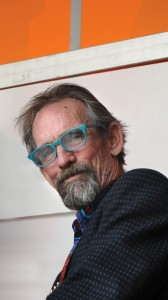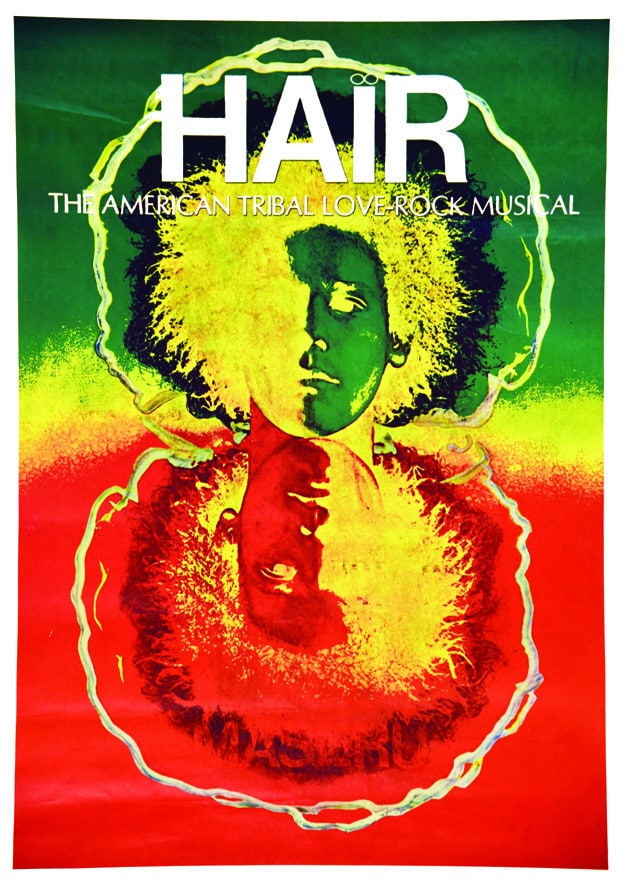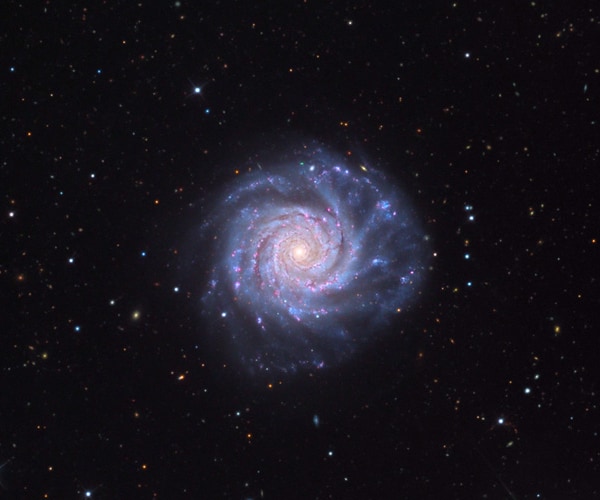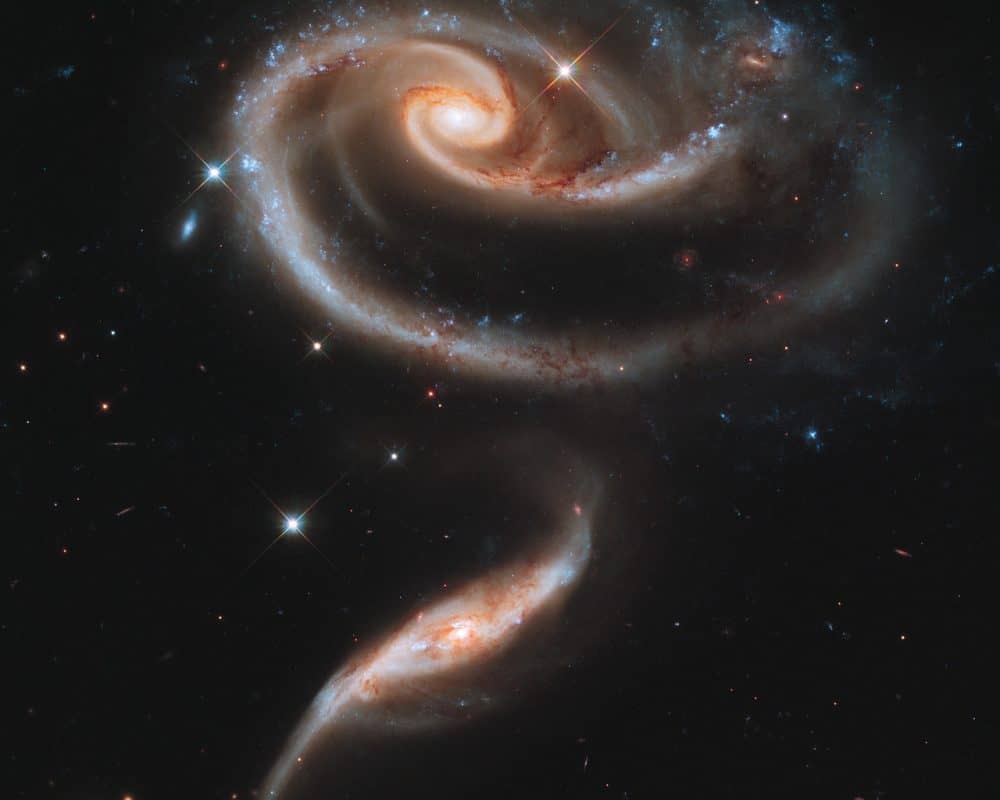Blog
The Tarantula Nebula, also known as 30 Doradus, is more than a thousand light-years in diameter, a giant star forming region within nearby satellite galaxy the Large Magellanic Cloud. About 180 thousand light-years away, it’s the largest, most violent star forming region known in the whole Local Group of galaxies. The cosmic arachnid sprawls across this spectacular view, composed with narrowband filter data centered on emission from ionized hydrogen atoms. Within the Tarantula (NGC 2070), intense radiation, stellar winds and supernova shocks from the central young cluster of massive stars, cataloged as R136, energize the nebular glow and shape the spidery filaments. Around the Tarantula are other star forming regions with young star clusters, filaments, and blown-out bubble-shaped clouds. In fact, the frame includes the site of the closest supernova in modern times, SN 1987A, left of center. The rich field of view spans about 1 degree or 2 full moons, in the southern constellation Dorado. But were the Tarantula Nebula closer, say 1,500 light-years distant like the local star forming Orion Nebula, it would take up half the sky.
more...Harold Eugene “Gene” Clark (November 17, 1944 – May 24, 1991) was an American singer-songwriter and founding member of the folk rock band the Byrds. He was the Byrds’ principal songwriter between 1964 and early 1966, writing most of the band’s best-known originals from this period, including “I’ll Feel a Whole Lot Better“, “She Don’t Care About Time“, and “Set You Free This Time“. Although he did not achieve commercial success as a solo artist, Clark was in the vanguard of popular music during much of his career, prefiguring developments in such disparate subgenres as psychedelic rock, baroque pop, newgrass, country rock, and alternative country.
Clark was born in Tipton, Missouri, the third of 13 children in a family of Irish, German, and American Indian heritage. His family moved to Kansas City, Missouri, where as a boy he began learning to play the guitar and harmonica from his father. He was soon playing Hank Williams tunes as well as material by early rockers such as Elvis Presley and the Everly Brothers. He began writing songs at the age of 11. By the time he was 15, he had developed a rich tenor voice, and he formed a local rock and roll combo, Joe Meyers and the Sharks. Like many of his generation, Clark developed an interest in folk music because of the popularity of the Kingston Trio. When he graduated from Bonner Springs High School, in Bonner Springs, Kansas, in 1962, he formed a folk group, the Rum Runners.
https://www.youtube.com/watch?v=OjU1f1vujbg
more...November 17, 1955-September 2, 2015
Phil began performing at an early age: A picture that hung in his parents’ house showed him in a straw hat, striped coat and cane at age four in the lead role for his school play.
Born in Dallas, Parnell started taking piano lessons at age five. At age eight the family moved to New Orleans. His interest in piano came from his mother, who played in church and at home.
 Parnell became obsessed with jazz after hearing John Coltrane. Before long, he was inspired to follow a musical career by listening to many others, including Art Tatum, Oscar Peterson, Charlie Parker, Bill Evans, James Booker, Dr. John and Ray Charles. “I was working for a painting contractor after school,” Parnell said. “I used to bring a boom-box cassette player with all my favorite jazz and it would drive the rest of the crew mad after a while. I was always doing something different from the other kids— usually solitary endeavors. I learned to ride a unicycle and to juggle,
Parnell became obsessed with jazz after hearing John Coltrane. Before long, he was inspired to follow a musical career by listening to many others, including Art Tatum, Oscar Peterson, Charlie Parker, Bill Evans, James Booker, Dr. John and Ray Charles. “I was working for a painting contractor after school,” Parnell said. “I used to bring a boom-box cassette player with all my favorite jazz and it would drive the rest of the crew mad after a while. I was always doing something different from the other kids— usually solitary endeavors. I learned to ride a unicycle and to juggle,
and was into trampoline, diving, gymnastics and art.”
As a teenager, Parnell studied piano with Ellis Marsalis. His son Joplin remembers, “Dad would often tell me the story of Ellis asking him to transcribe a song of his choice as homework. He brought back his attempts at transcribing Coltrane’s “Giant Steps,” which earned him a good deal of respect from his teacher for being so ambitious.
more...David Werner Amram III (born November 17, 1930) is an American composer, conductor, multi-instrumentalist, and author. As a classical composer and performer, his integration of jazz (including being one of the first noted as an improvising jazz French hornist), folkloric and world music has led him to work with the likes of Dizzy Gillespie, Lionel Hampton, Willie Nelson, Langston Hughes, Charles Mingus, Pepper Adams, Levon Helm, Betty Carter and Jack Kerouac.
Along with Julius Watkins, Amram is considered a pioneer of jazz French horn. He also plays piano, numerous flutes and whistles, percussion, and dozens of folkloric instruments from 25 countries, as well as being an improvisational lyricist. Since working with Leonard Bernstein, (who chose him as The New York Philharmonic’s first composer-in-residence in 1966), he has been one of BMI‘s twenty most performed composers of concert music of the last thirty years.
more...I got hired for the accompaniment ensemble performing; HAIR American tribal love rock musical
Performed by those who lived it! And some of us who still live it!
Mixed Blood Theater and Theater 55 (http://theatre55.org/current-projects/)
January 31st thru February 10th 2019 in Minneapolis
Friday 11-16-18 730pm
more...NGC 3938 is an unbarred spiral galaxy in the Ursa Major constellation. It was discovered on 6 February 1788 by William Herschel. It is one of the brightest spiral galaxies in the Ursa Major South galaxy group, and is roughly 67,000 light years in diameter. It is approximately 43 million light yearsaway from Earth. NGC 3938 is classified as type Sc under the Hubble sequence, a loosely wound spiral galaxy with a smaller and dimmer bulge.The spiral arms of the galaxy contain many areas of ionized atomic hydrogen gas, more so towards the center.
Two supernovae have been identified within NGC 3938. SN 2005ay is a type II supernova that was discovered on 27 March 2005 and had a magnitude of 15.6. SN 2017ein is a type Ic supernova that was discovered on 25 May 2017 and peaked at magnitude 14.9.
more...Allison Louise Crowe (born November 16, 1981) is a Canadian singer, songwriter, guitarist, and pianist born in Nanaimo, British Columbia, whose home is Corner Brook, Newfoundland and Labrador.
Crowe began performing professionally in 1996 at the age of fifteen, doing regular sets in coffee-houses and bars of Vancouver Island. Her recording debut came in 2001 with the EP Lisa’s Song + 6 Songs. Her first full-length albums, Secrets and Tidings, were released in 2004. (Tidings was originally released in EP form in 2003.) Allison Crowe: Live at Wood Hall, a double concert album, was released in July 2005.
Of Scottish, Irish, and Manx descent, Crowe grew up surrounded by jazz, classical music, and rock. She discovered additional influences, such as Ani DiFranco, Pearl Jam, Tori Amos, and Counting Crows. On Amazon.com‘s downloads, she has simultaneously been in the top three on the Rock Singer-Songwriters, Hymns, Blues, Jazz, Broadway, and British & Celtic Folk charts.
more...Charles Mitchell “Dolo” Coker (November 16, 1927 – April 13, 1983) was a jazz pianist and composer who recorded four albums for Xanadu Records and extensively as a sideman, for artists like Sonny Stitt, Gene Ammons, Lou Donaldson, Art Pepper, Philly Joe Jones, and Dexter Gordon.
Charles Mitchell “Dolo” Coker was born in Hartford, Connecticut on November 16, 1927, raised in both Philadelphia and Florence, South Carolina. The first musical instruments Coker played in childhood were the C-melody and alto saxophones, learning them at a school in Camden, South Carolina. By the age of thirteen he was starting to play piano. Coker moved to Philadelphia, where he studied piano at the Landis School of Music and at Orenstein’s Conservatory. Coker also played some shows on piano for Jimmy Heath while in Philadelphia.
He was also a member of the Frank Morgan Quartet (with Flip Greene on bass and Larance Marable on drums).
more...Albert Edwin Condon (November 16, 1905 – August 4, 1973) was an American jazz banjoist, guitarist, and bandleader. A leading figure in Chicago jazz, he also played piano and sang.
Condon was born in Goodland, Indiana, the son of John and Margaret (née McGraw) Condon. He grew up in Momence, Illinois, and Chicago Heights, Illinois, where he attended St. Agnes and Bloom High School. After playing ukulele, he switched to banjo and was a professional musician by 1921.
When he was 15 years old, he received his first union card in Waterloo, Iowa.
He was based in Chicago for most of the 1920s, and played with such jazz notables as Bix Beiderbecke, Jack Teagarden, and Frank Teschemacher. He and Red McKenzie formed the Chicago Rhythm Kings in 1925.
In 1928, Condon moved to New York City. He frequently arranged jazz sessions for various record labels, sometimes playing with the artists he brought to the recording studios, including Louis Armstrong and Fats Waller. He organised racially integrated recording sessions—when these were still rare—with Waller, Armstrong and Henry ‘Red’ Allen. He played with the band of Red Nichols for a time. Later, from 1938 he had a long association with Milt Gabler‘s Commodore Records.
more...World Music on Flamenco Fridays with Gypsy Kings Jose Reyes
more...Up and down the West Coast people are celebrating the remarkable and stunning vocal
work of Daptone Recording Artist, R&B legend Charles Bradley. The same production company that hosted the tantalizing Sharon Jones.
His performances and recording style were consistent with the revivalist approach of his main label Daptone Records, celebrating the feel of funk and soul music from the 1960s and 1970s. One review said he “echoes the evocative delivery of Otis Redding“.
more...Arp 273 is a pair of interacting galaxies, lying 300 million light years away in the constellation Andromeda. It was first described in the Atlas of Peculiar Galaxies, compiled by Halton Arp in 1966.The larger of the spiral galaxies, known as UGC 1810, is about five times more massive than the smaller galaxy. It has a disc that is tidally distorted into a rose-like shape by the gravitational pull of the companion galaxy below it, known as UGC 1813. The smaller galaxy shows distinct signs of active star formation at its nucleus, and “it is thought that the smaller galaxy has actually passed through the larger one.
more...Kevin Tyrone Eubanks (born November 15, 1957 in Philadelphia) is an American jazz and fusion guitarist and composer. He was the leader of The Tonight Show Band with host Jay Leno from 1995 to 2010. He also led the Primetime Band on the short-lived The Jay Leno Show.
Eubanks was born into a musical family. His mother, Vera Eubanks, is a gospel and classical pianist and organist. His uncle, Ray Bryant, was a jazz pianist. His older brother, Robin Eubanks, is a trombonist, and his younger brother Duane Eubanks is a trumpeter. Two cousins are also musicians, the late bassist David Eubanks and the pianist Charles Eubanks. Kevin studied violin and trumpet before settling on the guitar.
more...William Edward “Little Willie” John (November 15, 1937 – May 26, 1968)was an American R&B singer who performed in the 1950s and early 1960s. He is best known for his successes on the record charts, with songs such as “All Around the World” (1955), “Need Your Love So Bad” (1956), and “Fever” (1956). An important figure in R&B music of the 1950s, John was posthumously inducted into the Rock and Roll Hall of Fame in 1996.
John was born in Cullendale, Arkansas, one of ten children born to Lillie (née Robinson) and Mertis John. Many sources erroneously give his middle name as Edgar. His family moved to Detroit, Michigan, when he was four, so that his father could find factory work. In the late 1940s, the eldest children, including Willie, formed a gospel singing group. Willie also performed in talent shows, which brought him to the notice of Johnny Otis and, later, the musician and producer Henry Glover. After seeing him sing with the Paul “Hucklebuck” Williams orchestra, Glover signed him to a recording contract with King Records in 1955. He was nicknamed “Little Willie” for his short stature.
more...Gus Johnson (November 15, 1913 – February 6, 2000) was an American swing drummer in various jazz bands, born in Tyler, Texas, United States. After learning to play drums from his next-door neighbor, Johnson occasionally played professionally at the age of ten in the Lincoln Theater, and performed in various local groups, most notable McDavid’s Blue Rhythm Band. Upon graduating from Booker T. Washington High School, Johnson moved to Kansas City, where he took up drumming full-time. He joined Jay McShann‘s Orchestra in 1938, with his music career being interrupted by his conscription into the military in 1943.
In 1945, Johnson returned from his stint in the military, and relocated to Chicago to perform in the Jesse Miller Band. Johnson played on Willie Dixon’s debut album, ‘Willie’s Blues.’ He subsequently played alongside Count Basie and was recorded on the album Basie Rides Again in 1952. Following a recovery from appendicitis Johnson was featured in numerous groups and dozens of recordings in the 1960s. In 1972, his former bandmates from Jay McShann’s Orchestra reconvened to record Going to Kansas City. Although Johnson continued to tour into the 1980s, he developed Alzheimer’s disease in 1989, which he struggled with until his death on February 6, 2000.
more...More Posts
- Dudley Moore Day
- Bernie Worrell Day
- Alexis Korner Day
- World Music with Garmarna
- Daily Roots with Princess Kazayah
- Music for the Pandemic
- The Cosmos with NGC 2273
- Danny Gottlieb Day
- Clyde Stubblefield Day
- Clarence “Gatemouth” Brown Day
- Leo Parker Day
- Little Brother Montgomery Day
- World Music with Fadhilee Itulya
- Daily Roots with Headstrong
- Music for Surviving the Pandemic
- The Cosmos with M27
- Jan Hammer Day
- Buster Williams Day
- Johnny St. Cyr Day
- Chavela Vargas Day



